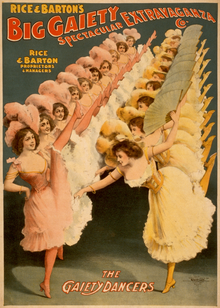Extravaganza
Appearance

An extravaganza is a literary or musical work (often musical theatre) characterized by freedom of style and structure and usually containing elements of burlesque, pantomime, music hall and parody. It sometimes also has elements of cabaret, circus, revue, variety, vaudeville and mime.[1] Extravaganza may more broadly refer to an elaborate, spectacular, and expensive theatrical production.[2]
The term was widely used to describe a type of 19th-century British drama made popular by James Planché. Planché defined it as "the whimsical treatment of a poetical subject."[3]
The term is derived from the Italian word stravaganza, meaning extravagance.
See also
References
- ^ "Encyclopædia Britannica online". Britannica.com. Retrieved 2014-08-23.
- ^ Ewen, David (1957). Panorama of American Popular Music. Prentice Hall.
- ^ Planché. The recollections and reflections of J.R. Planché (Somerset herald): a professional biography (1872), Vol. II, p. 43
